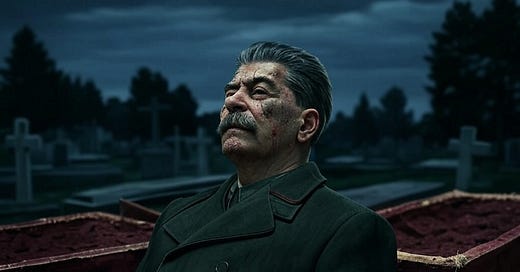Under Stalin, there was more freedom in Russia than under Putin
The history of the Moscow Empire is full of twists and turns: from being a vassal of the Golden Horde to the Romanov Empire, from revolutionary internationalism to imperial "Russian statism," from a liberal spring to "imperial reconquista."
One such transitional moment, which began in the late 1930s, was a significant blow to many romantic communists who fiercely opposed the imperial clichés of propaganda revived under Stalin. Strangely enough, those who publicly expressed their outrage at the time did not end up in camps or exile.
From Internationalism to an Imperial "Russian" Narrative
Komsomol members, raised on utopian ideals of internationalism, mythical heroes of the "Civil War," and other revolutionary myths, met Stalin's pivot to imperial "Russian grandeur" with great apprehension. As historian and war veteran Mikhail Gefter recalls, the idea of reviving imperial imagery was met with disdain among young communists of the 1930s:
"Before the war, when these things just started, we openly despised them. I remember a book about Suvorov was published, and in it, there was a chapter glorifying his storming of the Polish capital. We wrote a collective protest to the editorial board of 'Pravda,' not mincing words at all. We also strongly disapproved of Eisenstein's film 'Alexander Nevsky.' We openly criticized it in faculty wall newspapers," recalls Gefter.
Can you imagine? Within Stalin's system, there was a certain degree of freedom of expression, despite the harshness of the repressive apparatus. Young communists, nurtured on "Pavel Korchagin" and other hyperbolized ideals of social justice, did not fear voicing their dissatisfaction with how Soviet propaganda replaced proletarian consciousness with glorified figures of Russia's once-hated imperial past.
Freedom Within the "Given"
Gefter notes that before the war, the country retained an illusion of internal freedom, even amid the repressions. Stalin's regime, despite its criminal nature, allowed space for discussions within its paradigm. As Gefter puts it, "the Soviet was our given," and youth sought freedom within this "given." Collective protests and open criticism of films or books were possible as long as they stayed within the framework of communist ideology.
After what Stalin deemed a not entirely successful war, a new phase of strengthening imperial rhetoric began, and this "credit of freedoms" gradually disappeared. Gefter, as a veteran who survived injuries and war, recalled that his generation was inspired not by "Russian" imperial narratives and heroes but by the fiery articles of Ilya Ehrenburg — a figure embodying the anti-war and anti-fascist fervor of the time.
Why Is There Less Freedom Under Putin?
Comparing Stalin's "imperial renaissance" with Putin's attempts to make modern Russia an empire, it becomes clear that Stalin's system, for all its harshness, allowed for some level of internal discussion, thereby testing its acceptance by the masses. Today, even the slightest deviation from the party line or criticism of propaganda elicits an immediate and severe reaction — from being branded a "foreign agent" to criminal prosecution.
Imperial rhetoric under Putin has reached its peak: historical myths of "Great Russia" are presented as absolute, indisputable truth. There is no room for debate, and any attempt to question the official position ends in repression.
Ghosts of the Past
Gefter's story does not imply that Stalin's regime was softer than Putin's or that internal freedom can exist even in a repressive state. No.
The problem lies elsewhere, in a dimension Gefter, immersed in his context, did not grasp. Stalin understood that the cult of "Russian grandeur" could not and should not conflict with the utopian ideals of the communist revolution.
But modern Russia has no official ideology. There are only the remnants of old ideologies and the stench emanating from their graves. In this ideological crypt, any semblance of freedom seems impossible. Criticism of imperial propaganda, even if aimed at improving it from within, is perceived as a threat to the state.
Mikhail Gefter has a remarkable phrase aptly describing the phenomenon of "Russian" obsession with the past: "Our graves speak."
Exactly. Russia remains obsessed with unearthing the graves of history, listening not to the voice of reason but to whispers and echoes emanating from the depths of buried empires. Instead of looking to the future, the country continues to bend over the ashes of the past, seeking answers that have long lost relevance to the present.



